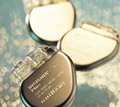 - Client Reviews
- Client Reviews June 27, 2006 – Boston Scientific Corp. on Monday recalled nearly 23,000 pacemakers and defibrillators that could fail because of an electrical flaw, and the company asked doctors to check 27,000 patients already implanted with potentially faulty devices.
June 27, 2006 – Boston Scientific Corp. on Monday recalled nearly 23,000 pacemakers and defibrillators that could fail because of an electrical flaw, and the company asked doctors to check 27,000 patients already implanted with potentially faulty devices.
The announcement marked the second time Boston Scientific has issued a warning about products of the former Guidant Corp. since the Natick, Mass.-based company bought Guidant in April for $27 billion.
Shares of Boston Scientific fell almost 8 percent in afternoon trading to their lowest level in nearly four years.
The company’s executives reiterated earlier warnings that they expect additional recalls involving Guidant heart devices.
The officials said Guidant-related troubles were no worse than they had expected when they launched a successful bidding war against Johnson & Johnson in December to acquire Guidant’s business in the $10 billion market for devices to restore a normal heart rhythm.
However, Jim Tobin, Boston Scientific’s president and CEO, said it could take as long as two years to fix design, manufacturing and supplier problems that triggered a wave of recalls and warnings last year involving nearly 300,000 devices of Indianapolis-based Guidant.
The problems involve far more than just Guidant’s shortcomings in promptly notifying doctors, patients and regulators about device flaws, Tobin said.
“In truth, there are deeper issues that will require time to address, that will lead to problems that will then have to be communicated,” Tobin told analysts during a conference call.
“It will take 18 months to two years to get all of those things taken care of,” Tobin said.
The latest recall involved certain manufacturing batches of an electrical component a low-voltage capacitor provided by an outside supplier.
Tobin said quality control reviews should have detected the problem. Instead, five malfunctions were reported in devices that either had already been surgically implanted or were about to be implanted.
“That should never happen, and it happened batch after batch after batch, and now we’re paying the price,” Tobin said.
No deaths were linked to the five malfunctions, but in two cases pacemaker patients temporarily became unconscious. In four cases, patients required surgery to replace devices.
Boston Scientific asked its sales force and managers of hospital inventories to return about 22,600 units of six models of pacemakers and defibrillators that have potentially faulty capacitors, which are used to store electrical charges.
A letter sent to doctors did not recommend potentially risky surgeries to remove another 27,200 implanted devices.
“Instead, we’re recommending that people see their doctors at the earliest opportunity,” company spokesman Paul Donovan said.
Boston Scientific advised doctors to check for signs of a malfunctioning capacitor, such as prematurely dead batteries or a device that stops working as intended.
Devices affected by the recall include certain units of Insignia and Nexus brand pacemakers, Contak Renewal TR/TR2 cardiac re-synchronization pacemakers, and Ventak Prizm 2, Vitality, and Vitality 2 cardioverter defibrillators.
Boston Scientific is trying to determine the expected failure rate for devices already implanted. Executives said the rate was probably around one in 10,000.
Executives declined to estimate how much the recall would cost the company, but said they were quickly replacing recalled inventory with new units and did not expect a drop-off in sales.
But Tobin warned, “This is probably not the last problem we are going to find. … I also know that everybody in the industry will have further recalls. It’s just that kind of business. The bottom line is nobody should panic because of a faulty capacitor.”
On May 15, Boston Scientific issued its first warning involving products it acquired from Guidant when it advised doctors that 996 defibrillator units could have a defect causing batteries to go dead prematurely.

